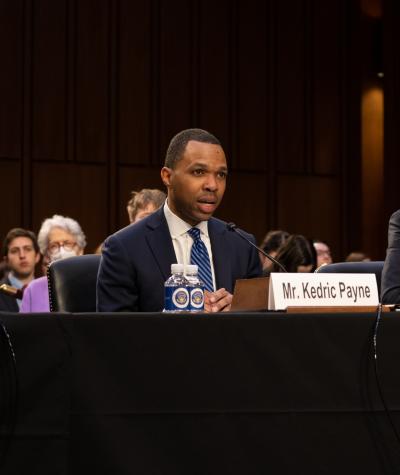On May 2, the U.S. Senate Committee on the Judiciary held a hearing on Supreme Court ethics reform. CLC’s Vice President, General Counsel, and Senior Director of Ethics Kedric Payne was one of five witnesses providing testimony for the hearing.
CLC’s testimony focused on how the Supreme Court’s ethics rules lag decades behind the executive and legislative branches. Specifically, CLC explained that, unlike the other two branches of our federal government, the Supreme Court does not have: 1) a formal internal ethics enforcement body to advise Justices about their legal obligations and to investigate alleged misconduct; 2) a binding code of conduct; 3) a requirement for full disclosure of privately sponsored travel; and 4) a formal recusal compliance procedure.
Over the past decade, the absence of such standard ethics rules and procedures has resulted in persistent concerns around actual or perceived conflicts of interest involving the Justices. This contributes to diminished public trust and low approval ratings.
The hearing made clear the importance of integrity in the Supreme Court and the need to prevent ethical misconduct by all Justices regardless of their ideologies or judicial philosophies.
While some senators questioned the constitutionality of Congress requiring ethics standards in the Supreme Court, several witnesses testified that Congress not only has the authority but the duty to enact legislation that ensures the Supreme Court operates effectively. This is a crucial part of the Constitution’s system of checks and balances, not a violation of separation of powers.
Although Sen. Lindsey Graham (R-SC), Ranking Member of the committee, expressed concern about a legislative approach, he emphasized the even more important point that there is bipartisan support for increased transparency in the Supreme Court. Moreover, he suggested that damage to the reputation of the nation’s highest court could occur without universally applied ethics standards that bind all Justices, regardless of appointing president or a Justice’s perceived political ideology. There is nothing preventing the Court from adopting such rules on its own.
The backdrop of the hearing was a deluge of reporting that uncovered potential ethics violations by multiple Supreme Court Justices. Justice Clarence Thomas omitted gifts of travel in his financial disclosure reports and failed to disclose the sale of properties to the same person who provided that undisclosed vacation travel.
Justice Neil Gorsuch similarly omitted required details relating to the sale of a property he co-owned to the Chair of a law firm that regularly argues before the Supreme Court. There was also the high-profile leak of the Dobbs v. Jackson Women’s Health Organization decision in 2022.
Because there are very few ethics rules governing Supreme Court justices, basically no enforcement mechanisms for the few rules on the books and an extreme lack of transparency, it is unclear how these ethics violations could be handled by the Court.
It is critical for the public’s trust in all our democratic institutions that the Supreme Court be held to the highest possible ethical standards. Establishing specific and relevant ethics practices that are effective in the other two branches to the Supreme Court can increase the public trust in the judiciary.
Providing accountability for ethics violations by way of an enforcement body, establishing a code of conduct, fully disclosing privately sponsored travel, and implementing a formal recusal process are a few meaningful steps in the right direction.

